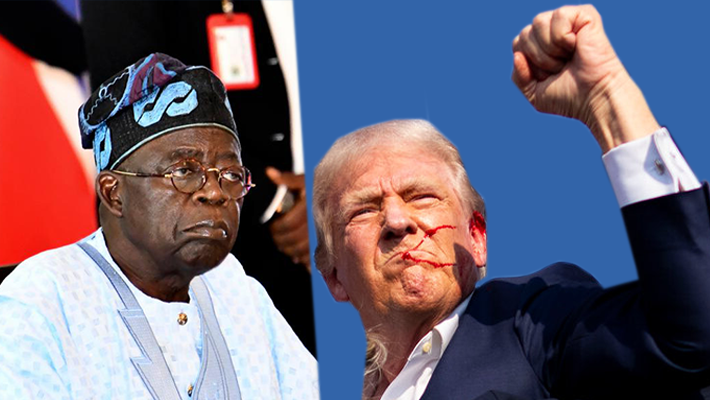By
Nze David N. Ugwu
When Adversity Unites Nations, But Not Ours
In February 2022, when Russian tanks rolled into Ukraine, the world watched in awe as a nation—fractured by politics and language—suddenly stood as one. Ukrainians who had once disagreed on everything rallied under their blue and yellow flag. When terrorists struck America on September 11, 2001, the shockwaves did not fragment the country; they fused it. Democrats and Republicans, liberals and conservatives, blacks and whites—everyone was simply American.

Adversity, for most nations, is a strange glue. It compels citizens to look beyond differences and defend a shared destiny. But in Nigeria, it does the opposite.
When the U.S. President Donald Trump recently threatened to send American troops to Nigeria—ostensibly over human rights concerns and the government’s handling of insecurity—many expected a national outcry of defiance, a patriotic chorus declaring, “We can handle our own affairs.”
Instead, the opposite happened. Trump’s threat split Nigerians into bitter camps. Some cheered his audacity, others condemned it as neo-colonial arrogance. Instead of rallying behind the flag, Nigerians retreated into their tribes, faiths, and factions. It was not just disagreement—it was polarization on steroids.
And therein lies the tragedy: Nigeria is perhaps the only country that cannot be united by adversity.
Trump’s Threat: A Mirror to Nigeria’s Deep Fractures
To understand the scale of the division, one only needs to scroll through Nigerian social media after Trump’s remarks. The reactions revealed a country incapable of speaking in one voice even when faced with external provocation.
In the North, many voices—especially among the political elite—interpreted Trump’s statement as a veiled insult to the Tinubu administration. In the South, some viewed it as poetic justice for years of perceived marginalization. Others saw it as a long-overdue international acknowledgment of the failures of governance.
On WhatsApp groups, Facebook forums, and X (formerly Twitter), the nation seemed to explode into ethnic interpretations. “They deserve it,” some said. “Let Trump come; maybe he will fix our leaders.” Others, more nationalist, warned of foreign interference.
But the bigger story was not Trump—it was us. His words were merely a spark that ignited an already dry forest of resentment and mistrust. It showed, once again, that Nigerians do not have a shared sense of national belonging strong enough to transcend political or ethnic identity.
We have become a federation of fault lines—held together not by shared conviction but by constitutional glue.
A Nation of Many Nations
To understand why adversity divides Nigeria, one must revisit her origin story.
When Lord Lugard in 1914 decided to amalgamate the Northern and Southern Protectorates, his goal was administrative efficiency, not national unity. Nigeria was not born out of shared struggle, but out of colonial convenience. The people who became “Nigerians” did not agree to a social contract—they were grouped together under one flag and told to live as one.
Sixty-five years after independence, that historical defect still defines us. Nigeria remains a country of many nations—Hausa, Yoruba, Igbo, Tiv, Kanuri, Ijaw, and dozens more—each with its own loyalties, gods, and heroes.
Our identity crisis runs deep. In moments of adversity, a Yoruba man first thinks as Yoruba; a Hausa woman first thinks as Hausa; an Igbo youth first thinks as Igbo. The idea of “Nigerian” comes last—if it comes at all.
This is why, when Trump threatened, Nigerians did not unite to defend the nation’s dignity. They merely asked, “Whose government is he threatening?” or “Which region will this affect more?”
In countries that have completed their nationhood journey, external threats awaken patriotism. In Nigeria, they awaken suspicion.
Why Adversity Fails to Unite Us
There are several reasons why adversity fails to unite Nigeria. The first is the absence of a shared national story. Nations that rally in crisis often have a unifying myth or collective memory—a moment of shared sacrifice or triumph that binds generations. America has its revolution. Ukraine has its resistance. South Africa has its struggle against apartheid.
Nigeria has none. Our civil war remains an open wound, not a shared memory. Our independence in 1960, instead of birthing a common vision, created a scramble for who controls the newly freed state. We have never agreed on who we are, what we want, or what it means to be Nigerian.
Second, Nigerians have deep distrust in leadership. Every national challenge is viewed through the lens of politics. When insecurity worsens, some believe it’s to discredit a northern president; when reforms fail, others say it’s to punish a region.
Because citizens no longer trust their leaders to act in the national interest, even foreign threats are interpreted as political opportunities. Trump’s threat was not seen as a national affront but as a weapon—something to be used for or against the government of the day.
Third, the collapse of national institutions has eroded the symbols that once bound us. The National Youth Service Corps (NYSC), created to promote unity, is now seen as a burden. The Nigerian Army, once the pride of the continent, is now viewed by many as partisan. Even our national anthem—beautiful and solemn—rings hollow in the ears of citizens who feel excluded from its promises of “peace and unity.”
Finally, poverty and inequality deepen the divide. In a nation where millions go hungry while a few flaunt obscene wealth, unity feels like a luxury. When adversity comes, citizens don’t unite—they compete for survival.
The Psychology of Disunity
Psychologically, Nigerians have been conditioned to mistrust one another. Decades of ethnic propaganda and religious manipulation have created a mindset of “us versus them.”
During elections, politicians reinforce this mindset with dangerous rhetoric: “Our people must not lose power.” “They want to dominate us.” “We must protect our region.” By the time a crisis hits, citizens are already mentally programmed to respond along those lines.
In 9/11 America, the slogan was “United We Stand.” In Nigeria, it becomes “Who caused it?” and “Who will benefit?”
Social media has worsened this psychology. Every event—no matter how national—is quickly refracted through ethnic prisms. Facts no longer matter; perception is everything. When Trump threatened Nigeria, the northern conservative saw a Western attack on Islam; the southern liberal saw justice against a corrupt elite.
Truth was the first casualty. Unity was the second
The Leadership Vacuum
But disunity does not happen in a vacuum—it thrives where leadership fails.
Nigerian leaders have never mastered the art of moral leadership—the capacity to unite people through trust and shared purpose. Instead, they often benefit from division. A divided citizenry is easier to rule, easier to distract, easier to manipulate.
When adversity comes, Nigerian leaders do not rally the nation; they rally their base. They do not call for unity; they call for loyalty.
Compare this with Volodymyr Zelensky of Ukraine. When the bombs began to fall, he refused to flee. His words, “I need ammunition, not a ride,” became a rallying cry for unity. His courage transformed fear into resistance.
Now imagine Nigeria in similar crisis—can we think of any leader whose words alone could unite us across tribe, faith, and region? Sadly, none comes to mind.
Our political class thrives on division because unity threatens their survival. A united Nigeria would demand accountability, equity, and justice. A divided Nigeria can always be distracted by identity politics.
The Cost of Disunity
The cost of Nigeria’s inability to unite is immense—and growing.
Economically, it keeps us unstable and unattractive to investors. No foreign company will invest heavily in a nation that can fracture overnight over ethnic tension. The absence of a national consensus makes long-term planning impossible.
Socially, disunity breeds insecurity. Where the state’s legitimacy is questioned, non-state actors rise—bandits, separatists, and militias who fill the void left by weak institutions.
Psychologically, Nigerians are tired. Tired of being citizens of a country that feels more like a battleground than a homeland. The exhaustion is visible—in the apathy towards national events, the declining voter turnout, the growing exodus of young talent, and the cynical laughter that greets every government promise.
Internationally, a disunited Nigeria cannot command respect. Other nations see through our divisions. When foreign powers make threats, they do so knowing we will never respond as one. That is why Trump’s threat did not frighten Nigeria—it fractured it.
A divided country invites disrespect because it projects weakness.
The Way Forward: Building Unity in a Fractured Land
Is Nigeria doomed to eternal disunity? Not necessarily. But unity will not fall from the sky—it must be built.
First, we must redefine Nigerian nationalism. Our current model—built on geography and imposed identity—has failed. True patriotism must be civic, not ethnic. We must begin to see ourselves as partners in a shared project, not rivals in a divided inheritance.
Second, leadership must model trust and inclusion. Nigerians are not allergic to unity; they are allergic to hypocrisy. A government that treats all citizens equally, delivers justice fairly, and distributes opportunities equitably will inspire loyalty far more than propaganda can.
Third, we must invest in national education and cultural memory. Children should grow up learning not just about colonialism and independence but about moments of collective success—Eyo Festival, Zik, Awolowo, Ahmadu Bello, Chioma Ajunwa, the Super Eagles of ’94. Shared pride builds shared identity.
Fourth, religious and ethnic dialogue must become routine, not occasional. We need structured conversations across regions—town halls, cultural exchanges, interfaith programs—that normalize diversity.
Lastly, citizens must reject divisive politics. The day Nigerians stop voting by tribe and start voting by competence will be the day adversity begins to unite us, not divide us.
Conclusion: The Tragedy and the Hope
The tragedy of Nigeria is not just that adversity divides us—it is that even prosperity cannot unite us. We are a people so scarred by mistrust that we see conspiracy in compassion, politics in every principle, and division in every difference.
But there is still hope. Nations are not born united—they are built. America once fought a civil war; Europe was torn by centuries of bloodshed. Yet they learned, through pain and vision, to put the nation above faction.
Nigeria’s turning point will come when we finally realize that unity is not the absence of difference, but the presence of purpose.
Trump’s threat, rather than divide us, should have reminded us of our dignity as a sovereign people. Instead, it revealed how fragile our identity remains. But it also offered a mirror—a painful reflection that may yet become a wake-up call.
If adversity cannot unite us, then perhaps truth can: the truth that no tribe, religion, or party will survive a broken Nigeria. Only together can we defend our dignity, shape our destiny, and reclaim the promise of this land.
Nze David N. Ugwu is the Managing Consultant of Knowledge Research Consult. He could be reached at [email protected] or +2348037269333.


